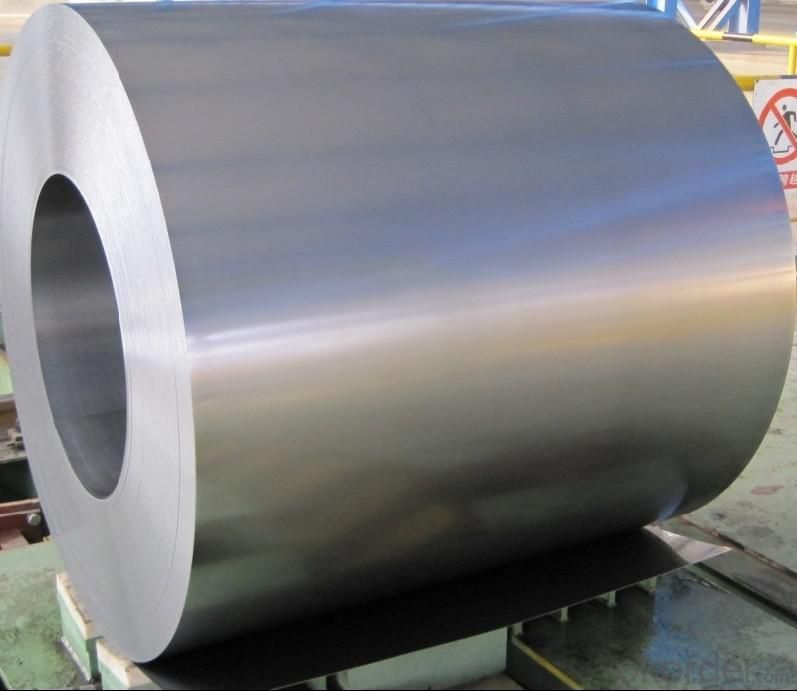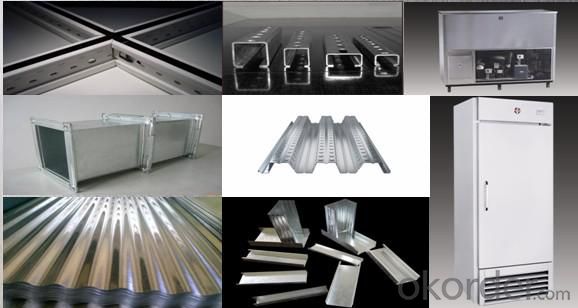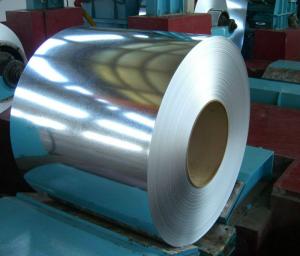Galvanized Steel Coil of Best Quality in China
- Loading Port:
- Shanghai
- Payment Terms:
- TT OR LC
- Min Order Qty:
- 100 m.t.
- Supply Capability:
- 10000 m.t./month
OKorder Service Pledge
OKorder Financial Service
You Might Also Like
Hot-dip Zinc Coating Steel Building Roof Walls
1.Structure of Hot-Dip Galvanized Steel Sheet Description:
Hot-dip galvanized steel coils are available with a pure zinc coating through the hot-dip galvanizing process. It offers the economy, strength and formability of steel combined with the corrosion resistance of zinc. The hot-dip process is the process by which steel gets coated in layers of zinc to protect against rust. It is especially useful for countless outdoor and industrial applications. Production of cold formed corrugated sheets and profiles for roofing, cladding, decking, tiles, sandwich walls, rainwater protective systems, air conditioning duct as well as electrical appliances and engineering.
2.Main Features of the Hot-Dip Galvanized Steel Sheet:
• Excellent process capability
• Smooth and flat surface
• Workability, durability
• Excellent anticorrosive property
• High strength
• Good formability
• Good visual effect
3.Hot-Dip Galvanized Steel Sheet Images


4.Hot-Dip Galvanized Steel Sheet Specification
Standard: ASTM, JIS,EN
Grade: CS, DX51D+Z,SGCC, SS 230~550,S220GD+Z~S550GD+Z, SGC340~SGC570
Thickness: 0.1mm~5mm
Width: max 2000mm
Coil weight:3-12 MT
Coil ID:508/610mm
Surface structure: zero spangle, regular spangle or minimum spangle
Surface treatment: Chromate treatment, Oiled/dry, skinpassed/non-skinpassed
Packing: Standard seaworthy export package
Technology test results:
| Processability | Yield strength | Elongation % | Elongation % | 180°cold-bending |
| Common PV | - | 270-500 | - | d=0,intact,no zinc removal |
| Mechanical interlocking JY | - | 270-500 | - | d=0,intact,no zinc removal |
| Structure JG | >=240 | >=370 | >=18 | d=0,intact,no zinc removal |
| Deep drawn SC | - | 270-380 | >=30 | d=0,intact,no zinc removal |
| EDDQ SC | - | 270-380 | >=30 | d=0,intact,no zinc removal |
5.FAQ of Hot-Dip Galvanized Steel Sheet
We have organized several common questions for our clients,may help you sincerely:
1.How about your company?
A world class manufacturer & supplier of castings forging in carbon steel and alloy steel,is one of the large-scale professional investment casting production bases in China,consisting of both casting foundry forging and machining factory. Annually more than 8000 tons Precision casting and forging parts are exported to markets in Europe,America and Japan. OEM casting and forging service available according to customer’s requirements.
2.How to guarantee the quality of the products?
We have established the international advanced quality management system,every link from raw material to final product we have strict quality test;We resolutely put an end to unqualified products flowing into the market. At the same time, we will provide necessary follow-up service assurance.
3. How long can we receive the product after purchase?
Usually within thirty working days after receiving buyer’s advance payment or LC. We will arrange the factory manufacturing as soon as possible. The cargo readiness usually takes 15-30 days, but the shipment will depend on the vessel situation.
- Q:I have an old classical guitar, which uses nylon strings. ive never really liked the sound produced by the nylon, so im curious if you can use a classical guitar with acoustic guitar steel strings. thanks!
- Do not put steel strings on a classical guitar under any circumstances. It will quickly and completely destroy the guitar. Classical guitars are lightly braced since nylon strings are relatively low tension. The additional tension of the steel strings will quickly warp the top and rip off the bridge. Ignore the know-nothing who gave you dangerous advice.
- Q:They are showing on tv a special on how the new World Trade Center, building 1, is being built. Focusing on the steel and the guys fitting everything together.Where do builders go to buy all that steel framing? We do not build really tall buildings where I live so most of the steel is cut and welded on the job site. At World Trade Center 1, they seem to get the steel on trucks; already cut and welded.
- The steel is all custom fabricated in what are called structural steel fabrication shops. Each Building is designed by architects then the frame is designed by engineers to support whatever load is being applied to the building. After the engineering is done it goes out for a bid package where a fab shop estimates how much to charge for the fabrication of the steel and the erection of the steel. Once a company wins the bid, it then has to design how the steel will connect with one another and have it approved by an engineering firm to assure the connections are strong enough. Once all of that happens the fab shop orders raw steel beams and angle iron and steel plate at stock lengths. Beams are then cut into the right length and holes drilled in the proper places. The beam is then marked with a number that tells the erectors where it goes. The steel is then shipped out in batches to the construction site where it is unloaded and shook out into an organized place to grab them with a crane. They are then put together like a toy model, there are instructions that say what beam goes where and what size bolt to use. The welding you see being done is on really critical moments that need extra strength. That is about how it goes in a nutshell. It is a bit more complicated than that but it gives you an idea.
- Q:How does the thickness of a steel coil affect its applications?
- The thickness of a steel coil affects its applications by determining its strength, durability, and versatility. Thicker steel coils are typically stronger and more resistant to bending or deformation, making them suitable for heavy-duty applications such as construction projects, automotive manufacturing, and infrastructure development. Thinner steel coils, on the other hand, are more flexible and easier to shape, making them ideal for applications that require intricate designs or a lightweight material, such as in the production of electronics, household appliances, or packaging materials. Ultimately, the thickness of a steel coil plays a crucial role in determining its suitability for specific applications based on the desired strength, flexibility, and weight requirements.
- Q:What are the different types of steel coil leveling methods?
- There are three main types of steel coil leveling methods: roller leveling, stretcher leveling, and temper leveling. Roller leveling involves passing the coil through a series of rollers to reduce its curvature and improve flatness. Stretcher leveling uses hydraulic or mechanical stretching to remove the coil's internal stresses and straighten it. Temper leveling, on the other hand, subjects the coil to a controlled heating and cooling process to achieve the desired flatness. Each method has its own advantages and is chosen based on the specific requirements of the steel coil.
- Q:How are steel coils used in the manufacturing of packaging materials?
- Steel coils are often used in the manufacturing of packaging materials such as cans, drums, and metal sheets. These coils are unwound and processed through various machines to form the desired shape and size of the packaging material. The steel coils provide strength, durability, and a protective barrier, ensuring the safety and preservation of the packaged goods.
- Q:What are the different types of coil leveling machines?
- There are several different types of coil leveling machines used in various industries. Some of the most common types include: 1. Precision Roll Levelers: These machines are highly accurate and capable of leveling coils with high precision. They use a series of rolls to apply pressure and remove any distortions or imperfections in the coil. 2. Straighteners: Straighteners are used to flatten coils that have become curved or warped during the manufacturing process. They typically consist of a set of rollers that gradually bend the coil in the opposite direction to restore its flatness. 3. Rotary Levelers: Rotary levelers are used to level coils that are thicker or have a higher yield strength. They utilize a series of rolls that rotate in opposite directions to apply pressure and flatten the coil. 4. Tension Levelers: Tension levelers are commonly used for leveling thin-gauge coils. They work by applying tension to the coil while passing it through a series of rollers. This process helps to remove any waviness or unevenness in the coil. 5. Stretch Levelers: Stretch levelers are specifically designed to level coils made of high-strength materials. They use a combination of stretching and bending to remove any irregularities in the coil's surface. 6. Cut-to-Length Lines: These machines not only level the coil but also cut it into specific lengths as per the customer's requirements. They are commonly used in industries where precision and customization are essential, such as automotive or construction. Overall, the choice of coil leveling machine depends on factors such as the type and thickness of the coil, desired level of accuracy, and the intended application of the leveled coil.
- Q:How are steel coils priced in the market?
- Steel coils are priced in the market based on various factors such as the current demand and supply levels, raw material costs, production and transportation expenses, market competition, and overall market conditions. Additionally, quality, size, and specifications of the steel coils also play a role in determining their pricing.
- Q:i mean cor ten steel( rusted)
- Bill summed it up pretty quick and provided a link. For some reason you are focusing on the copper content when it really is insignificant in the overall picture of the sun hitting its surface. If you could elaborate more, maybe we could offer a better answer.
- Q:How are steel coils used in the production of electrical connectors?
- Steel coils are used in the production of electrical connectors as a primary material for manufacturing the connector's housing or casing. The steel coils are typically shaped, cut, and formed into the desired shape and size before being further processed and assembled with other components to create the final electrical connector product.
- Q:I've heard different things bout them, though I do not know this. Oh, and if you know where you can buy some raw or get custom made stuff out of black steel please let me know it would be greatly appreciated. Oh and my friend told me there is a black steel that can be sharpened and silver will be underneath, is this also true? Thank you very much for answering ^^
- black steel and black tron are not same.
1. Manufacturer Overview |
|
|---|---|
| Location | |
| Year Established | |
| Annual Output Value | |
| Main Markets | |
| Company Certifications | |
2. Manufacturer Certificates |
|
|---|---|
| a) Certification Name | |
| Range | |
| Reference | |
| Validity Period | |
3. Manufacturer Capability |
|
|---|---|
| a)Trade Capacity | |
| Nearest Port | |
| Export Percentage | |
| No.of Employees in Trade Department | |
| Language Spoken: | |
| b)Factory Information | |
| Factory Size: | |
| No. of Production Lines | |
| Contract Manufacturing | |
| Product Price Range | |
Send your message to us
Galvanized Steel Coil of Best Quality in China
- Loading Port:
- Shanghai
- Payment Terms:
- TT OR LC
- Min Order Qty:
- 100 m.t.
- Supply Capability:
- 10000 m.t./month
OKorder Service Pledge
OKorder Financial Service
Similar products
New products
Hot products
Related keywords




























